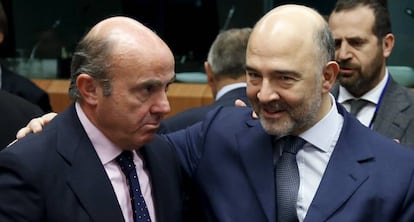Spain negotiates one-year extension with Brussels to rein in the deficit
EU recognizes that Spain is in an “atypical” situation due to its lack of government

Spain’s acting economy minister, Luis de Guindos, has negotiated a new deadline for bringing the country’s public deficit down within the European Union’s target range.
At last weekend’s International Monetary Fund summit in Washington DC, De Guindos spoke with Economic and Financial Affairs Commissioner Pierre Moscovici about giving Spain another year to balance its accounts, according to sources in La Moncloa, the seat of government.
The decision still has to be cleared at the highest level in Brussels, where the EU executive is waiting to see Spain’s final 2015 deficit figures and for a new government to take power in Madrid following the inconclusive elections of December 20.
Spain is in an atypical situation, in a political vacuum with no government
EU source
Brussels could even consider giving Spain a second year to reduce the deficit from around 5% of GDP to under 3%, depending on the IMF’s next economic forecast, due for release in May.
In the meantime, the Spanish government has already announced a €2 billion budget adjustment, reduced its own growth forecast in view of the upcoming global slowdown, and is now seeking ways to rein in spending by its regional governments without sparking a row.
Spanish acting Finance Minister Cristóbal Montoro has blamed regional spending for Spain’s significant deviation from its 2015 target of 4.2%. On Thursday, Eurostat is expected to release final figures that will help the European Commission reach a decision regarding Spain’s deadlines.
A high-ranking EU source said that the technical analysis and the negotiations are both at an advanced stage, but that the high-level political debate has yet to start.
European officials know that Spain cannot possibly meet its targets the way things stand now. Bringing the deficit down from 5% to under 3% in one year “would be a tremendous challenge for any economy, even in the middle of a boom,” said one source.
And Spain is not in the middle of a boom, even if its economy has been growing faster than its neighbors, at more than 3% of GDP last year. But De Guindos is now forecasting 2.7% in 2016 and 2.4% in 2017. Meanwhile, the unemployment rate continues to be much higher than before the crisis hit.
Even the most orthodox thinkers in Brussels feel that Madrid will need at least one extra year to contain the deficit. “It could be two, depending on the new forecasts, because the adjustment has to be reasonable,” said one EU source.
But there are no free lunches, and in exchange for the extra time, Brussels will reinforce its oversight of Spain’s efforts, with quarterly reports and the threat of sanctions if results do not meet expectations.
“Spain is in an atypical situation, in a political vacuum with no government,” said an EU source. “In other cases we’ve waited, and in this case it may also make sense to wait to see how political unknowns are cleared up.”
English version by Susana Urra.
Tu suscripción se está usando en otro dispositivo
¿Quieres añadir otro usuario a tu suscripción?
Si continúas leyendo en este dispositivo, no se podrá leer en el otro.
FlechaTu suscripción se está usando en otro dispositivo y solo puedes acceder a EL PAÍS desde un dispositivo a la vez.
Si quieres compartir tu cuenta, cambia tu suscripción a la modalidad Premium, así podrás añadir otro usuario. Cada uno accederá con su propia cuenta de email, lo que os permitirá personalizar vuestra experiencia en EL PAÍS.
¿Tienes una suscripción de empresa? Accede aquí para contratar más cuentas.
En el caso de no saber quién está usando tu cuenta, te recomendamos cambiar tu contraseña aquí.
Si decides continuar compartiendo tu cuenta, este mensaje se mostrará en tu dispositivo y en el de la otra persona que está usando tu cuenta de forma indefinida, afectando a tu experiencia de lectura. Puedes consultar aquí los términos y condiciones de la suscripción digital.








































